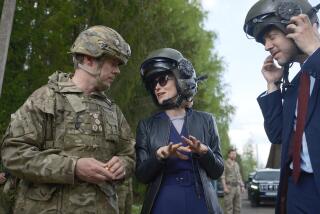Lithuanians--From Euphoria to Tense Anger
- Share via
VILNIUS, Soviet Union — For two weeks now, Lithuania seemed a fairy-tale democracy--a tiny, orderly republic on the Baltic Sea where stargazers, poets and music professors took over the government and installed themselves in the halls of Communist power in something of a peaceful coup d’etat.
But if the events of the last few weeks here have a storybook quality to them, the response to them from Moscow over the past two days is the dragon outside the castle door.
The rumblings started earlier last week with a series of ultimatums and proclamations from Mos cow seeming to indicate that authorities there were ready to take control of the functions of government in the republic.
Then there were military planes that flew over the city, rumors of Soviet army maneuvers on the border, a flurry of reports from authorities in Moscow that roads into the republic were blocked and menacing dispatches from the Soviet news agency Tass about “extremist nationalists” taking power in Lithuania and a breakdown of law and order.
But through it all, Lithuanians stayed calm; the streets of the city appeared virtually unchanged. The restaurants, shops and cafes continued to do brisk business as Lithuanians met and drank and joked about the reports coming out of Moscow.
Until, that is, the early hours of Saturday morning, when the rumblings grew to a roar as more than 100 tanks and trucks filled with armed soldiers drove past the Parliament building here. They didn’t stop, they didn’t slow down, but they gave a good scare to the legislators meeting inside, stoically working on the formation of the first non-Communist-led government in the Soviet Union.
By dawn Saturday, the people of this republic were visibly tense, for the first time in the two weeks since Lithuania boldly declared itself independent of the Soviet Union. They were also angry at what Lithuanian President Vytautas Landsbergis has repeatedly called a “psychological war” being waged against them.
“We are angry, yes, but this is nothing new for us,” said Vitas Laskauskas, 47, an industrial engineer from Vilnius. “But the more they interfere with us, the more we stand on our own two feet. This flying planes over the city, tanks in the streets, this is like a child’s game. We are not truly afraid.”
The anxiety was in stark contrast to the measured, reserved way nationalist leaders here have installed themselves in the halls of power and calmly proclaimed themselves a sovereign state since sweeping local Communists from power in elections Feb. 24.
In the Parliament building Saturday, legislators paced nervously, wondering in whispers what the tanks in the middle of the night meant.
In the headquarters of Sajudis--the coalition of nationalist groups whose leaders form the core of the new government here--young volunteers talked defiantly among themselves about defending their country.
Meanwhile, outside the windows of the Parliament building, army trucks passed by periodically throughout the day--in one instance, 16 at once. Inside, guards were carefully checking credentials and registering all people entering the building for the first time since the new government came to power.
At polling places where Lithuanians went Saturday to vote in local elections, talk turned to the tanks--few seemed to have seen them, but everyone appeared to know someone who had.
In the high-ceilinged chamber of the Parliament building, the attitude was businesslike--but despite the brave face, legislators rubbed their eyes wearily and at one moment broke into heated discussion on whether Soviet security agents rumored to be deployed throughout the republic these days were listening in on the building’s telephone lines.
On Saturday morning, Landsbergis spoke on Lithuanian television in an address apparently designed to calm the fears of Lithuania’s minority groups. He spoke in Russian, and he pleaded for calm, saying that Soviet authorities might be looking for an excuse to take power here.
Mixed with the nervousness, however, was determination--especially at the Parliament building, where young, politically involved volunteers have stayed awake for nights and days on end and helped to run the makeshift government.
“I am not in a panic, no,” said Egle Taurinskaite, 24, a young Sajudis worker. “I know that I am determined. I already decided my position when I started working in Sajudis. That moment when the tanks came by, that was the moment, perhaps the absolute test of my resolve. Now I am calm, because now I know that I can conquer my passions and my fears.”
Late Saturday night at the Parliament building, Lithuania’s new leaders were still meeting--and still looking out the window periodically as if half expecting the tanks to come again. But they did not. And by midnight, the day that had started with the ominous advance of tanks on the Lithuanian Parliament building ended without relief to the tense waiting of the people in this small city.
More to Read
Sign up for Essential California
The most important California stories and recommendations in your inbox every morning.
You may occasionally receive promotional content from the Los Angeles Times.













